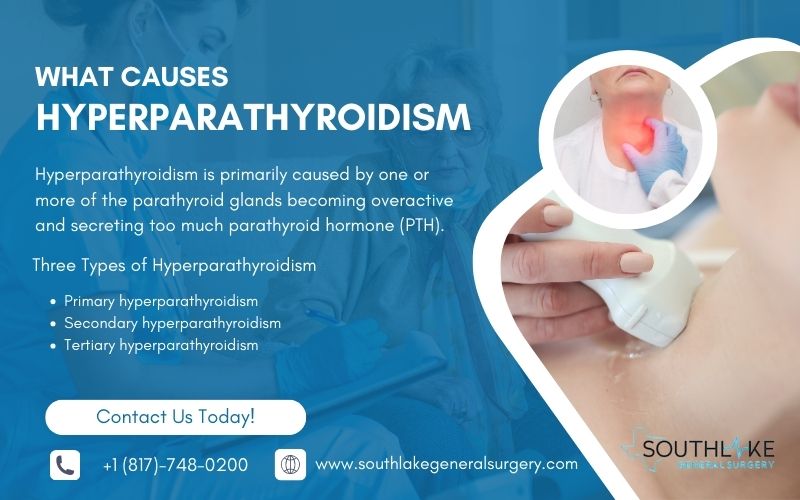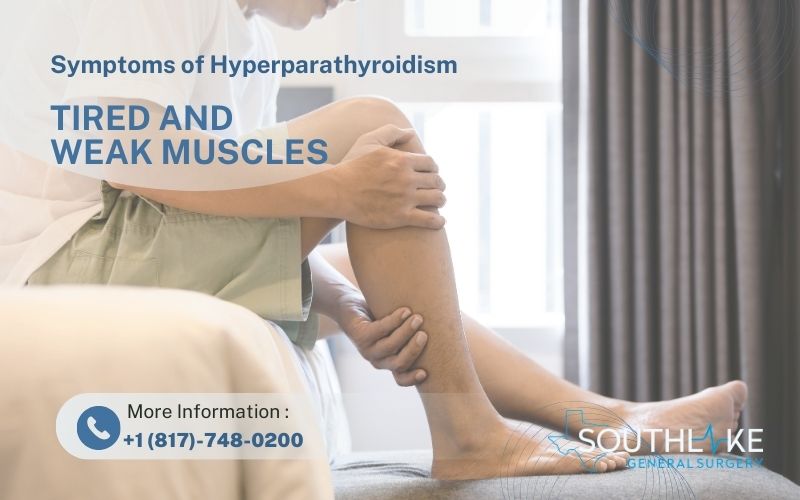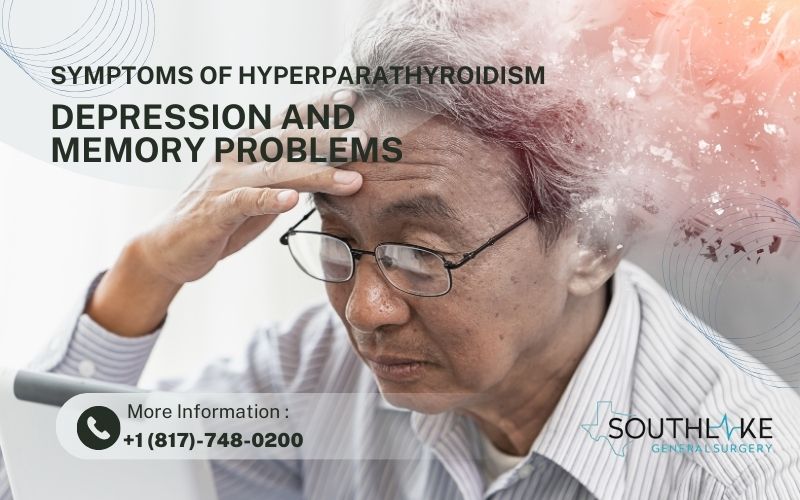Hyperparathyroidism, a condition resulting from an imbalance of blood calcium levels, can significantly impact one’s health and well-being.
Recognizing the symptoms of hyperparathyroidism and understanding the potential risks associated with this disorder is essential for the early detection and effective treatment of chronic kidney disease. Are you aware of the common indicators and possible complications of hyperparathyroidism?
In this comprehensive guide, we will explore the various symptoms and health impacts of hyperparathyroidism. Together, we will delve into the less common symptoms, risk factors, diagnostic procedures, treatment options, and when to consult a healthcare professional. By the end of this blog post, you will be equipped with the knowledge to identify and address this condition effectively.
Key Takeaways
- Hyperparathyroidism can cause bone pain, muscle weakness and fatigue, kidney stones, depression, and memory problems.
- Risk factors for hyperparathyroidism include age, gender, radiation therapy, and certain medications.
- Diagnosis is made through routine blood tests. Treatment options include surgery or medication, depending on individual circumstances.
What Causes Hyperparathyroidism?

Hyperparathyroidism is primarily caused by one or more of the parathyroid glands becoming overactive and secreting too much parathyroid hormone (PTH). This overproduction of PTH can lead to high levels of calcium in the blood, a condition known as hypercalcemia.
There are three types of hyperparathyroidism: primary, secondary, and tertiary.
- Primary hyperparathyroidism is the most common type and is usually caused by a non-cancerous tumor (adenoma) or hyperplasia of one or more of the parathyroid glands.
- Secondary hyperparathyroidism typically occurs as a response to low calcium levels in the body. This can be due to various factors, such as kidney disease or vitamin D deficiency.
- Tertiary hyperparathyroidism is a rare form that usually occurs in people who have had long-term secondary hyperparathyroidism, typically due to chronic kidney disease.
It’s worth noting that while anyone can develop this condition, certain factors increase the risk of hyperparathyroidism. These include age (it is more common in older adults), gender (women are more likely to develop it), certain genetic conditions, and exposure to radiation in the neck area.
Common Symptoms of Hyperparathyroidism

Hyperparathyroidism, which is related to the thyroid gland and parathyroid gland, often manifests itself through symptoms such as bone pain, muscle weakness, and kidney stones. These common symptoms arise due to high blood calcium levels, which are triggered by excess parathyroid hormone (PTH) production from the parathyroid glands.
We will now analyze these symptoms thoroughly.
Bone Pain and Weakness
When the parathyroid glands release too much PTH, also known as too severe calcium deficiency or much parathyroid hormone, too much calcium is extracted from the bones, leading to osteoporosis and an increased risk of fractures.
Bone pain and weakness are common symptoms of hyperparathyroidism, caused by the continuous removal of calcium from the bones. This process results in a net decrease in bone mass, as the uncontrolled effects of parathyroid hormone on bone calcium homeostasis ultimately lead to a reduction in bone mineral density and bone demineralization.
Early identification and management of bone-related symptoms are key, as untreated hyperparathyroidism can lead to serious complications of kidney disease like osteoporosis and kidney failure.
Understanding the connection between bone pain, weakness, and hyperparathyroidism can empower individuals to seek treatment and prevent further deterioration of bone health.
Muscle Weakness and Fatigue

Hyperparathyroidism can also lead to muscle weakness and fatigue, affecting daily activities and overall quality of life. The overproduction of parathyroid hormone (PTH) is responsible for these symptoms, as it can cause metabolic disturbances in skeletal muscle.
Recognizing and managing muscle weakness and fatigue can help hyperparathyroidism patients enhance their daily functioning and overall well-being.
Early intervention is vital, as untreated muscle-related symptoms can exacerbate the condition’s negative impact on one’s quality of life.
Kidney Stones
Kidney stones are another common symptom of hyperparathyroidism, forming when excess calcium in your blood is excreted through urine. Elevated calcium levels in the urine, caused by hyperparathyroidism, can lead to the formation of these painful and potentially damaging stones. Studies have reported that the prevalence of kidney stones among individuals with hyperparathyroidism ranges from 7% to 70%, depending on the study.
Those experiencing kidney stones should:
- Seek medical advice for potential urinary tract issues
- Address the root cause, which could be hyperparathyroidism
- Early detection and treatment can help prevent further complications and improve the individual’s overall health.
Less Common Symptoms and Complications
Beyond the typical symptoms, hyperparathyroidism can also present with less common manifestations, such as
- depression
- memory problems
- cardiovascular issues
While these symptoms may require further investigation to establish a clear connection to hyperparathyroidism, being aware of these potential complications can help individuals and healthcare professionals identify and address the condition more effectively.
Depression and Memory Problems

Mental health and cognitive function can also be affected by hyperparathyroidism, as the condition has been linked to depression and memory problems.
Research suggests that elevated parathyroid hormone levels and diminished vitamin D levels are significantly correlated with the degree of depression in hyperparathyroidism patients. Treatment of hyperparathyroidism generally leads to the normalization of mood.
Impaired cognition and memory loss are other known symptoms associated with hyperparathyroidism. Parathyroidectomy, or surgical removal of the parathyroid glands, has been shown to improve memory and cognitive function in individuals with the condition.
Being aware of the potential impact on mental health can help individuals seek appropriate treatment and support when needed.
Cardiovascular Issues
Cardiovascular issues, such as high blood pressure and heart disease, may also be associated with hyperparathyroidism; however, more research is needed to confirm the connection.
Elevated levels of parathyroid hormone (PTH) and calcium have been observed to contribute to hypertension in cases of hyperparathyroidism. Parathyroidectomy has been shown to decrease systolic blood pressure, though the precise cause-and-effect relationship between hyperparathyroidism and high blood pressure remains to be fully elucidated.
Awareness of the possible link between hyperparathyroidism and cardiovascular complications is necessary, as early detection and intervention can help prevent further problems.
By closely monitoring their heart health, individuals with hyperparathyroidism can ensure they receive the necessary care and support to manage their condition effectively.
Risk Factors for Hyperparathyroidism
There are several risk factors associated with hyperparathyroidism, including:
- Age
- Gender
- Radiation therapy
- Nutritional deficiencies
- Certain medications, such as lithium
Primary hyperparathyroidism, a condition affecting the four parathyroid glands, is most commonly observed among individuals between the ages of 50 and 60, with women being affected 3 to 4 times more frequently than men. In contrast to tertiary hyperparathyroidism, secondary hyperparathyroidism is a separate condition that also involves the parathyroid glands.
Understanding these risk factors can assist individuals in determining their likelihood of developing hyperparathyroidism and taking suitable measures to prevent or manage the disorder.
By understanding the potential triggers and maintaining a healthy lifestyle, one can reduce their risk of developing hyperparathyroidism and its associated complications.
Diagnosing Hyperparathyroidism
Diagnosing hyperparathyroidism involves various tests, including routine blood tests, urine tests, bone density test, and imaging scans, to detect elevated calcium and parathyroid hormone levels.
These tests serve different purposes, such as detecting excessive calcium and potential bone fractures, identifying non-malignant tumors in the parathyroid and thyroid glands themselves, demonstrating calcium deposits or blockages, and uncovering bone loss or weakening.
Proper interpretation of these blood test results is necessary to confirm the diagnosis of primary hyperparathyroidism, typically characterized by persistent hypercalcemia and an elevated serum PTH level.
Additionally, analyzing the urine during a 24-hour window can help determine the amount of calcium the body is excreting, further aiding in the diagnosis of hyperparathyroidism.
It is crucial to undergo these diagnostic tests in a timely manner to ensure proper treatment and management of the condition.
Treatment Options for Hyperparathyroidism
Treatment options for hyperparathyroidism may include:
- Surgery (parathyroidectomy) is the most prevalent and definitive treatment for primary hyperparathyroidism. It can achieve a cure rate of approximately 95% for the condition.
- Medication may be used to manage symptoms and control calcium levels in some cases.
- Monitoring, which involves regular check-ups and blood tests to monitor calcium levels and the progression of the condition.
The specific treatment approach will depend on the severity of the condition and the patient’s preferences.
In some cases, medication may be prescribed to manage the symptoms of asymptomatic hyperparathyroidism, particularly when surgery is not an option.
For individuals with asymptomatic primary hyperparathyroidism, monitoring the condition through regular blood tests and follow-up appointments can be an appropriate course of action.
Establishing the most suitable treatment plan for hyperparathyroidism necessitates a comprehensive discussion with a healthcare professional, considering the individual’s specific circumstances and preferences.
By considering all available options, patients can make informed decisions about their care and receive the most appropriate treatment for their condition.
When to See a Doctor
If you experience symptoms of hyperparathyroidism, such as bone pain, muscle weakness, or kidney stones, it is important to consult a healthcare professional for proper diagnosis and treatment. Early detection and intervention are crucial for preventing further complications and improving overall health outcomes.
In addition to addressing the typical symptoms, it is essential to seek medical advice if you suspect you may have a familial form of primary hyperparathyroidism, such as:
- multiple endocrine neoplasia type I or type II,
- neonatal severe primary hyperparathyroidism, or
- hyperparathyroidism-jaw tumor syndrome
By being proactive about your health and discussing your concerns with a healthcare professional, you can ensure that any potential issues are addressed promptly and effectively.
Summary
In conclusion, understanding the symptoms and health impacts of hyperparathyroidism is essential for early detection and effective treatment.
By recognizing the common symptoms, such as bone pain, muscle weakness, and kidney stones, as well as the less common complications like depression, memory problems, and cardiovascular issues, individuals can take appropriate steps to address this condition.
If you suspect you may have hyperparathyroidism, it is crucial to consult a healthcare professional for a proper diagnosis and to explore the available treatment options. By staying informed and proactive about your health, you can ensure the best possible outcomes for your well-being.
A Note From Southlake General Surgery
Southlake General Surgery team is dedicated to providing top-notch care for patients with hyperparathyroidism and other endocrine disorders. Our team is equipped with extensive experience and expertise to guide you through your diagnosis, treatment, and recovery.
We believe in patient education and will ensure you understand your condition and treatment options thoroughly. Early detection is crucial in managing this medical condition, so don’t hesitate to contact us if you experience any symptoms. Thank you for entrusting your healthcare to us.
Schedule Your Visit Today!
Don’t let your health concerns linger. Now is the time to take a proactive step towards your well-being. Schedule an appointment with Dr. Valeria Simone MD, a leading specialist in the field of General Surgery at Southlake General Surgery, Texas, USA.
Dr. Simone and her dedicated team are committed to providing comprehensive, patient-centered care. With a focus on early detection and effective treatment strategies, they are here to guide you through your health journey. Remember, your health is our priority.
Reach out to us today at +1(817) 748-0200 and let’s work together for a healthier you!
You can also make an online appointment with us.
Frequently Asked Questions
1. What are the symptoms of too much parathyroid hormone?
Symptoms of too much parathyroid hormone include fatigue, depression, memory problems, bone pain, joint pain, loss of appetite, muscle weakness, feeling thirsty and peeing more than usual, feeling sick, constipation, and tummy pain.
2. What personality changes with hyperparathyroidism?
This condition can cause mental disturbances in more than 50% of cases, including mild to severe personality changes, a lack of initiative and depression, and even acute organic psychosis.
3. Should you take vitamin D if you have hyperparathyroidism?
Yes, you should take vitamin D if you have hyperparathyroidism, provided that the vitamin D and levels of calcium are monitored and you discontinue the vitamin D supplement or take it if any new symptoms arise.
4. Why do I feel so bad with hyperparathyroidism?
Hyperparathyroidism can lead to “psychiatric” problems, fatigue, and other physical symptoms that may make you feel bad. High blood calcium is the most common symptom associated with the condition.
5. What are some less common symptoms and complications of hyperparathyroidism?
Less common symptoms and complications of hyperparathyroidism include depression, memory problems, and cardiovascular issues like high blood pressure and heart disease.
Medically Reviewed By: Dr. Valeria Simone MD
Board-certified General Surgeon at Southlake General Surgery, Texas, USA.
Follow us on Facebook and YouTube.
References:
- Primary Hyperparathyroidism. (2022, July 23). National Institute of Diabetes and Digestive and Kidney Diseases. https://www.niddk.nih.gov/health-information/endocrine-diseases/primary-hyperparathyroidism
- Hyperparathyroidism: MedlinePlus Medical Encyclopedia. (n.d.). https://medlineplus.gov/ency/article/001215.htm
- Taniegra, E. D. (2004, January 15). Hyperparathyroidism. AAFP. https://www.aafp.org/pubs/afp/issues/2004/0115/p333.html

